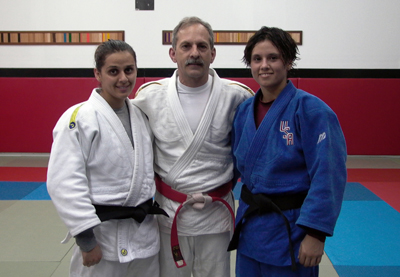Gerald Lafon was born in New York City in 1951. In 1961, his family moved from Secaucus, New Jersey to Paris, France. Since his father Pierre had been a judoplayer in the 1940s in France and England, he too got the “Judo bug” and started his training in 1965 under Jacques Bardel, 2nd dan. Upon his return to the U.S. in 1969, he served in the U.S. Marine Corps from 1970-71, spending one tour of duty in Vietnam as a field radio operator. In 1972, he continued his Judo training under Benso Tsuji, 6th dan and became the head instructor of San Diego City College Judo Club, a newly formed student club. Promoted to black belt in 1974, he became the first certified coach (USJF) in the San Diego area. In 1978, after six years of teaching at San Diego City College and at various local YMCAs, he established a permanent training site for his club.
After a few years as a coach, Coach Lafon became disillusioned with traditional training methods and began searching for a more effective pedagogical system. Fortunately, at an opportune time in his career he was greatly influenced by British “new Judo” innovator Geof Gleeson, whose ideas were introduced to him by American coaches Phil Porter and Bill Montgomery. Gleeson’s greatest contribution to the sport of Judo was to encourage coaches to think “outside the box” and to reject many traditional methods unsuited to the participants from the Western hemisphere.
While Gleeson filled in many of the blanks and answered many of his misgivings, he was still not completely satisfied with the information that was available from within the Judo community. So he researched the more scientifically developed training programs in other sports around the world to confirm what he thought was lacking with traditional Judo methods.
After hundreds of articles, dozens of books, many discussions with progressive colleagues, and countless bouts of trial and error, Coach Lafon developed an effective training philosophy that revolves around the following tenets:
• Train the way you intend to perform
• Dynamic moving drills, not static uchi komi, to develop effective Judo skills
• Gymnastics skills to prevent being scored upon
• Early study of effective international Judo rather than reliance on classical Judo
• Use of situational drills to mimic actual situations in randori and competition
• Constant and immediate skill analysis and feedback to the athletes
• Sequential and terminal Judo based on combinations, counters and transitions
• Emphasis on biomechanically sound skills
• Training based on scientific research not tradition or myths
• Quality training rather than quantity
• Creative games and warm-ups to develop basic psychomotor skills
He is a voracious reader who believes that he who dares to teach should never cease to learn. He has been very involved in coach education, having served as a member of the USJA Coach Certification Committee since the early 1980s. He continues to work and correspond with coaches throughout the world. He has authored many articles, which have appeared in USJA Coach, American Judo, Growing Judo, and many Internet sites interested in his training ideas.
He can be reached in San Diego, California at glafon@judoamerica.com or (858) 578-7748.

The author with his two “international” daughters: Natalie Lafon (2011 World Championships) and Valerie Lafon Gotay (1992 and 2008 Olympian)

I’d love it if sometime you could post your requirements for the various lower dan ranks. I know you have opinions on those and I’m curious to hear them.
If you go to http://judoamerica.com/sandiego/members_promotions_requirements.shtml, you’ll find requirements for shodan and nidan.
Hi, I really enjoy your articles. I’m planning on starting my own judo club in Brooklyn in the next 6 months. Would you be available to answer some questions to help me with the starting up process?
Feel free to call me when you need questions answered.